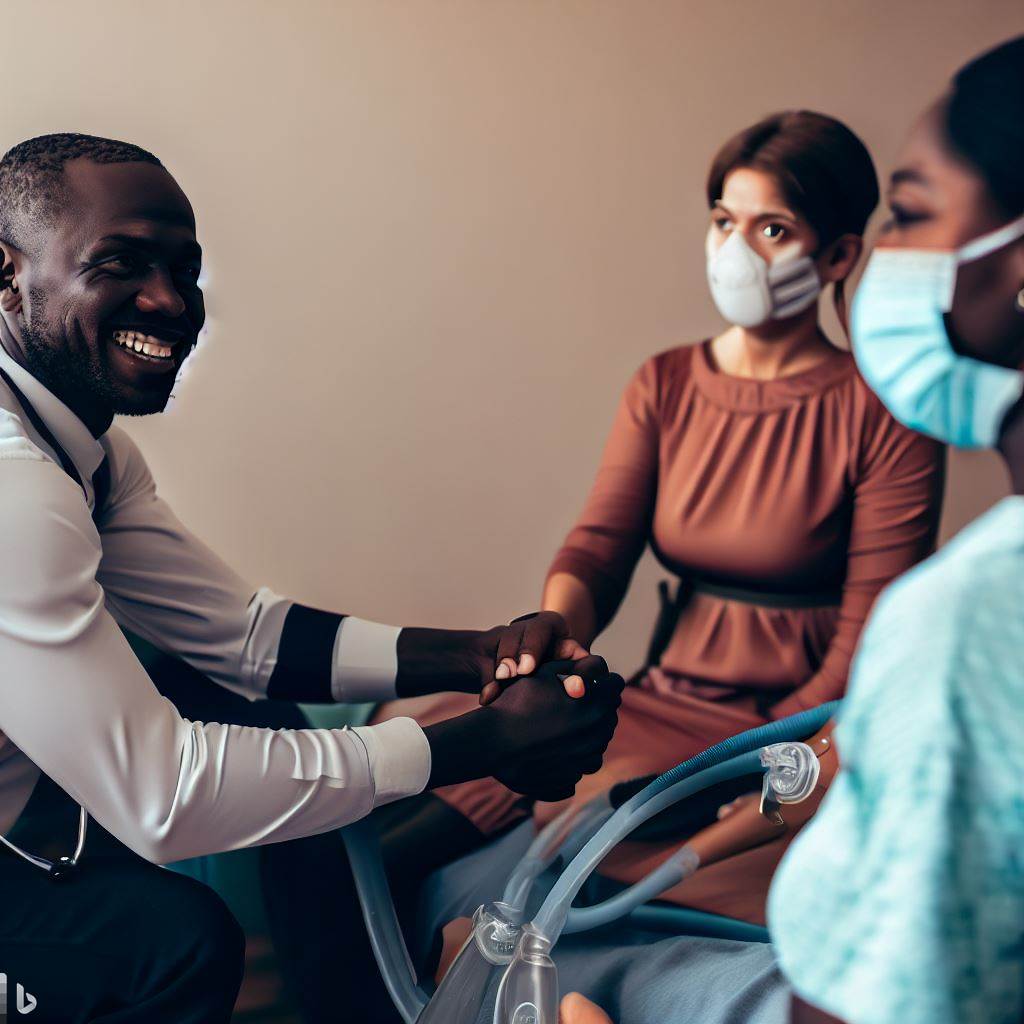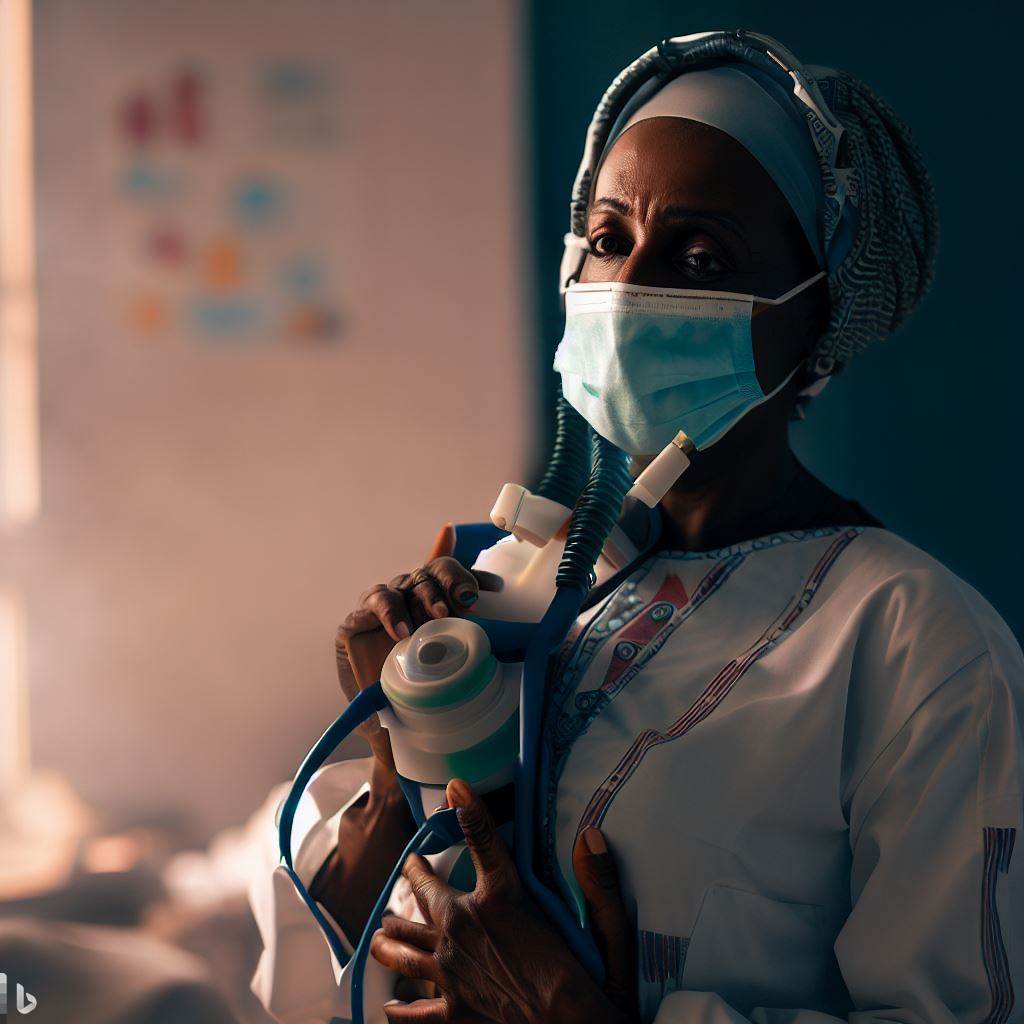Introduction
Respiratory health significantly impacts our overall well-being. This blog post explores the roles of respiratory therapists and pulmonologists in managing respiratory conditions.
Respiratory therapists and pulmonologists are both vital healthcare professionals specialized in respiratory care.
Respiratory therapists are experts in assessing and treating various breathing issues.
They administer therapies, monitor ventilator use, and provide patient education on managing respiratory conditions.
On the other hand, pulmonologists are medical doctors specializing in respiratory diseases.
They diagnose and treat complex respiratory disorders, such as asthma, chronic obstructive pulmonary disease (COPD), and lung cancer.
Pulmonologists also perform procedures like bronchoscopy to examine the airways and obtain lung tissue samples for analysis.
Collaboration between respiratory therapists and pulmonologists is common, as they work together to optimize patient care.
Respiratory therapists provide continuous support and therapy, while pulmonologists offer advanced medical interventions and treatment plans.
Overall, both respiratory therapists and pulmonologists are indispensable in maintaining respiratory health and enhancing overall well-being.
Their combined efforts contribute to better outcomes for patients with respiratory conditions.
Education and Training
Education and training are crucial for both respiratory therapists and pulmonologists.
Understanding the differences in their educational paths highlights the distinct roles they play in respiratory care.
Respiratory Therapists
Respiratory therapists are healthcare professionals who work closely with patients suffering from respiratory conditions.
They provide diagnostic tests, develop treatment plans, and deliver therapies under the guidance of physicians.
Transform Your Career in Nigeria
Discover unmatched expertise with our personalized Career Consulting service. Navigate Nigeria’s job market with a strategy tailored just for you.
Get StartedAssociate’s degree vs Bachelor’s degree programs
Individuals interested in becoming respiratory therapists can choose between associate’s degree programs or pursue a bachelor’s degree.
Associate’s degree programs generally take two years to complete, while bachelor’s degree programs typically require four years.
Required certifications and licenses
Upon completing the required degree program, respiratory therapists must obtain the necessary certifications and licenses.
The most common certification is the Certified Respiratory Therapist (CRT) credential, which is awarded by the National Board for Respiratory Care (NBRC).
Some states may have additional licensure requirements as well.
Pulmonologists
Pulmonologists are medical doctors who specialize in diagnosing and treating diseases related to the respiratory system.
They primarily focus on conditions such as asthma, pneumonia, chronic obstructive pulmonary disease (COPD), and lung cancer.
Completion of medical school and residency programs
Pulmonologists begin their journey by completing medical school, which typically takes four years.
After this, they must complete a residency program, usually in internal medicine or pediatrics, which lasts around three years.
During this residency, they gain foundational knowledge and practical experience in various medical specialties.
Specialization in pulmonology through fellowship training
Once the residency is complete, aspiring pulmonologists then pursue a fellowship in pulmonology.
This fellowship usually lasts two to three years and provides specialized training in the diagnosis and treatment of respiratory diseases.
Pulmonologists also have the option to further specialize in subfields like sleep medicine or critical care medicine.
Lastly, while both respiratory therapists and pulmonologists play crucial roles in respiratory care, their educational paths differ.
Respiratory therapists can enter the field with either an associate’s or bachelor’s degree, while pulmonologists require completion of medical school, residency programs, and specialized fellowship training.
These educational journeys equip them with the necessary knowledge and skills to provide the best care for patients with respiratory conditions.
Scope of Practice
In the field of respiratory healthcare, there are two important roles: respiratory therapists and pulmonologists.
While both professionals focus on the respiratory system, they have different scopes of practice.
Understanding their individual roles is crucial to providing effective care for patients.
Respiratory Therapists
Respiratory therapists play a fundamental role in diagnosing and treating respiratory conditions.
Their scope of practice includes performing diagnostic tests, administering respiratory treatments, managing ventilator support, and providing education and support to patients and their families.
- Diagnostic Tests: Respiratory therapists are trained to perform tests such as pulmonary function tests. These tests assess lung function and help in diagnosing respiratory conditions.
- Respiratory Treatments: They are responsible for administering various respiratory treatments and therapies to patients. These treatments aim to improve lung function and alleviate respiratory symptoms.
- Ventilator Support: Respiratory therapists assist in managing ventilator support for patients who require assistance with breathing. They ensure proper functioning of the equipment and monitor patients’ progress.
- Education and Support: They provide education and support to patients and their families. This includes educating them about respiratory conditions, treatment options, and self-care techniques.
Pulmonologists
Pulmonologists are medical doctors who specialize in diagnosing and treating respiratory conditions and diseases.
Their scope of practice involves conducting medical examinations, interpreting test results, prescribing medications, and performing procedures when necessary.
- Diagnosis and Treatment: Pulmonologists have extensive knowledge and expertise in diagnosing and treating various respiratory conditions and diseases.
They utilize medical examinations, test results, and patient history to accurately diagnose and develop treatment plans. - Test Interpretation: They interpret test results to further understand the underlying respiratory conditions. This helps in determining the most appropriate treatment approach for each patient.
- Medication and Treatment Plans: Pulmonologists prescribe medications and develop comprehensive treatment plans tailored to each patient’s needs.
They consider factors such as the severity of the condition and individual patient preferences. - Procedures: In certain cases, pulmonologists perform procedures like bronchoscopy or thoracentesis. These procedures allow them to visualize the respiratory system and obtain samples for further analysis.
Most importantly, respiratory therapists and pulmonologists play distinct roles in respiratory healthcare.
Publish Your Professional Profile, Business or Brand
Showcase your expertise, gain trust, and boost visibility instantly on Professions.ng.
Publish NowRespiratory therapists focus on diagnosing and administering treatments, while pulmonologists specialize in diagnosing, prescribing medications, and performing procedures.
Collaborating together, they provide comprehensive care for patients and ensure optimal respiratory health.
Patient Population
In the healthcare field, respiratory therapists and pulmonologists play vital roles in the management and treatment of respiratory conditions.
While both professionals deal with the respiratory system, they have different scopes of practice and areas of expertise.
One of the main aspects that distinguish them is the patient population they serve.
Respiratory Therapists
Respiratory therapists are healthcare professionals who work closely with patients and medical teams to provide care for a wide range of respiratory conditions.
They bring their expertise to various settings, including hospitals, clinics, and home healthcare.
One of the advantages of respiratory therapists is their ability to work with patients of all ages, from newborns to the elderly.
Work with patients of all ages, from newborns to the elderly
Respiratory therapists are trained to address respiratory problems across the lifespan.
They are skilled in assessing, diagnosing, and treating conditions such as asthma, chronic obstructive pulmonary disease (COPD), pneumonia, and respiratory distress syndrome in newborns.
They work collaboratively with physicians, nurses, and other medical professionals to develop and implement appropriate treatment plans.
Common conditions they encounter
Respiratory therapists frequently encounter patients with chronic and acute respiratory diseases.
Asthma, a chronic inflammatory condition that affects the airways, is commonly seen.
They also work with individuals diagnosed with chronic obstructive pulmonary disease, which includes conditions like emphysema and chronic bronchitis.
Additionally, respiratory therapists assist patients with acute respiratory distress, respiratory infections, and those requiring mechanical ventilation.
Pulmonologists
Pulmonologists are medical doctors who specialize in the respiratory system, with a particular focus on diagnosing and treating complex respiratory conditions.
They possess advanced knowledge and training in pulmonary medicine, enabling them to provide a higher level of care for patients with respiratory ailments.
Specialize in the diagnosis and treatment of complex respiratory conditions
Pulmonologists are highly skilled in diagnosing and managing a wide range of respiratory conditions.
They conduct thorough evaluations, order and interpret diagnostic tests, and develop comprehensive treatment plans tailored to each patient’s specific needs.
They focus on complex cases that may require specialized interventions or procedures.
May focus on specific age groups or conditions
Within the field of pulmonology, there are specialized areas of practice.
Pediatric pulmonologists concentrate on respiratory issues specific to children, including developmental lung disorders and congenital abnormalities.
Sleep medicine specialists focus on diagnosing and treating sleep-related breathing disorders such as sleep apnea.
Other pulmonologists may have expertise in interventional pulmonology, lung cancer, or critical care medicine.
Therefore, while both respiratory therapists and pulmonologists have expertise in the respiratory system, they differ in their patient populations and areas of focus.
Respiratory therapists are versatile professionals who work with patients of all ages, providing care for a wide range of respiratory conditions.
On the other hand, pulmonologists are medical doctors with specialized training, capable of diagnosing and treating complex respiratory ailments.
Their focus may vary, including specific age groups or conditions such as pediatrics or sleep medicine.
Ultimately, both professions are essential in improving the respiratory health and well-being of patients.
Read: Training and Qualifications for Respiratory Therapists in Nigeria

Collaborative Efforts and Teamwork
Respiratory therapists and pulmonologists play distinct but complementary roles in providing comprehensive respiratory care.
Their collaboration and teamwork significantly contribute to improved patient outcomes.
Role of Respiratory Therapists and Pulmonologists in Respiratory Care
Respiratory therapists work closely with pulmonologists to design personalized treatment plans for patients.
Their unique expertise in respiratory conditions allows them to contribute valuable insights during treatment plan development.
Additionally, respiratory therapists actively participate in discussions, sharing their specialized knowledge to inform informed decisions.
Furthermore, one of the crucial responsibilities of respiratory therapists is to communicate patient progress and updates to the entire medical team.
Regular consultations with pulmonologists facilitate detailed feedback on the effectiveness of ongoing treatments and any changes in the patient’s condition, ensuring a coordinated and well-informed approach to care.
Interdisciplinary Approach
An interdisciplinary approach in respiratory care involves the combined efforts of healthcare professionals from various disciplines.
This collaboration brings diverse perspectives and expertise to the table, enabling the development of comprehensive treatment plans that consider all aspects of the patient’s health.
Publish Your Professional Profile, Business or Brand
Showcase your expertise, gain trust, and boost visibility instantly on Professions.ng.
Publish NowTeamwork and collaboration among healthcare professionals have several significant benefits.
It allows for the sharing of knowledge and expertise, empowering each team member to better understand and address respiratory issues.
Respiratory therapists, with their specialized training, play a vital role in educating other healthcare professionals about various respiratory conditions and their management, resulting in more personalized and effective patient care.
In essence, the collaborative efforts of respiratory therapists and pulmonologists are essential for providing optimal respiratory care.
By working together as a cohesive team, they develop personalized treatment plans and ensure effective communication throughout the medical team.
The interdisciplinary approach, driven by teamwork and collaboration, leads to improved patient outcomes by leveraging the combined expertise of healthcare professionals from different disciplines.
Read: Regulations and Laws Governing Respiratory Therapists in Nigeria
Work Settings
Respiratory therapists and pulmonologists work in different settings based on their specialization in treating respiratory illnesses and disorders.
Understanding their work environments can help individuals decide which path to pursue in the field of respiratory care.
Respiratory Therapists
Respiratory therapists primarily work in hospitals, where they play a crucial role in critical care settings such as the intensive care unit (ICU) and emergency departments.
They provide immediate respiratory care to patients in life-threatening situations.
Aside from hospitals, respiratory therapists can also find employment in sleep clinics.
Sleep disorders, such as sleep apnea, require specialized care, and these therapists assist in diagnosing and treating patients in sleep clinics.
Additionally, respiratory therapists may work in pulmonary rehabilitation centers.
These centers provide comprehensive care for individuals with chronic respiratory diseases, helping them manage their condition and improve their overall lung function.
Moreover, some respiratory therapists may choose to provide care in a home healthcare setting.
They visit patients at their homes, offering treatments and therapies to individuals who are unable to visit hospitals or clinics regularly.
Pulmonologists
Pulmonologists, on the other hand, have a wider range of work settings available to them.
They can establish their private practices, where they offer specialized respiratory care to patients on an outpatient basis.
Pulmonologists also collaborate with clinics and hospitals, providing consultations and comprehensive respiratory care to patients requiring specialized treatment.
Their expertise in diagnosing and managing respiratory diseases makes them valuable members of healthcare teams in these settings.
Furthermore, pulmonologists may choose to pursue careers in research institutions.
They contribute to advancements in respiratory medicine by conducting studies, exploring innovative treatment approaches, and participating in clinical trials.
Additionally, pulmonologists can work in academic settings, where they teach and mentor aspiring healthcare professionals.
Their expertise and experience in respiratory care make them valuable assets in educating the next generation of healthcare providers.
Finally, pulmonologists may choose to work in teaching hospitals, where they combine their clinical practice with teaching responsibilities.
In these settings, they train medical students, residents, and fellows, sharing their knowledge and skills to shape the future of respiratory care.
In short, respiratory therapists primarily work in hospitals, sleep clinics, pulmonary rehabilitation centers, and home healthcare settings.
Pulmonologists, on the other hand, have a wider range of work options, including private practices, clinics, hospitals, research institutions, academic settings, and teaching hospitals.
Understanding the work settings of these healthcare professionals can help individuals make informed decisions about their career paths in the field of respiratory care.
Read: Challenges Facing Respiratory Therapists in Nigeria
Salary and Job Outlook
Respiratory therapists and pulmonologists are both essential healthcare professionals specializing in respiratory care.
While they share a common focus, there are distinct differences in their salary and job outlook.
Respiratory Therapists
Respiratory therapists enjoy a promising financial outlook with a competitive median annual salary.
Their earnings have the potential for significant growth over time, making it an attractive career choice.
The healthcare industry demands skilled respiratory therapists to ensure quality patient care.
As experts in diagnosing, treating, and managing respiratory conditions, their expertise is highly valued, resulting in abundant job opportunities across various healthcare settings.
Pulmonologists
Pulmonologists, on the other hand, command a higher median annual salary compared to respiratory therapists.
Their specialized knowledge and advanced medical training contribute to their potential earnings.
As specialists in respiratory medicine, pulmonologists play a crucial role in diagnosing and treating complex respiratory conditions.
Publish Your Professional Profile, Business or Brand
Showcase your expertise, gain trust, and boost visibility instantly on Professions.ng.
Publish NowPositive projections for job growth and demand in the field are expected due to the increasing incidence of respiratory diseases. Advancements in medical technology and research further drive the demand for pulmonologists.
In the end, respiratory therapists and pulmonologists have distinct salary and job outlooks.
Respiratory therapists enjoy a promising financial outlook and high demand in the healthcare industry, while pulmonologists command higher salaries and are in demand due to their specialized expertise in respiratory medicine.
Both professions are vital in ensuring respiratory health and quality patient care.
Read: Career Advancement Opportunities for Nigerian Respiratory Therapists
Conclusion
Recap of the key differences and similarities between respiratory therapists and pulmonologists
Respiratory therapists and pulmonologists both play vital roles in managing respiratory conditions.
While respiratory therapists primarily focus on direct patient care, pulmonologists are physicians who diagnose and treat respiratory disorders.
Respiratory therapists work closely with pulmonologists to implement treatment plans, monitor patient progress, and provide education and support to patients and their families.
Emphasis on the collaborative nature of their roles in providing respiratory care
Both respiratory therapists and pulmonologists collaborate closely to ensure optimal respiratory health outcomes for their patients.
By working collaboratively, they can combine their expertise and knowledge to develop comprehensive treatment plans and make informed decisions regarding patient care.
Encouragement for individuals interested in pursuing a career in either profession
For individuals passionate about respiratory health, both respiratory therapy and pulmonology offer fulfilling career paths.
Whether as a respiratory therapist providing direct patient care or as a pulmonologist diagnosing and treating complex respiratory conditions, both roles offer opportunities to positively impact the lives of patients and contribute to their overall well-being.
In summary, while respiratory therapists and pulmonologists have different levels of training and responsibilities, they are both vital in the field of respiratory care.
By recognizing their collaborative roles and the impact they can make on respiratory health, individuals interested in pursuing a career in either profession can find fulfillment in improving the lives of those with respiratory conditions.




